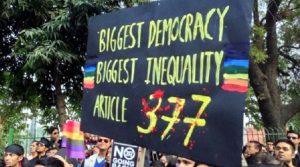People with alternate sexualities have been under the shackles of Section 377 for far too long. It was introduced to us in the British era and then somehow became an integral part of our constitution even after our independence. What is Section 377? Well, after all the discussion surrounding it in the past month I doubt that anyone would not be aware of it but let me just take a leaf out of the Wikipedia page for you, just in case you aren’t aware of it:
“Section 377 of the Indian Penal Code is a section of the Indian Penal Code introduced in 1861 during the British rule of India. Modelled on the Buggery Act of 1533, it is used to criminalize sexual activities “against the order of nature”.”
Now, most people believe that section 377 criminalises just the gay people. That’s only half true though. It actually has no direct reference to homosexuality but is rather directed towards the sexual acts against the order of nature. Did you know that even a blowjob or oral sex can be a criminal offence as per this law even if you’re straight?

We at Indiangaysite.com, have been doing our part at normalising the sexual aspect of homosexuality since long before the decriminalisation. IGS has been the public venting ground of gay and bisexual Indian men to showcase their sexuality to the world and to tell the world that we aren’t afraid. We have been the goto medium for curious and experimenting gay men to figure out their sexuality without the associated taboo, and have been pleasing the gay populace for years now while always going against this discriminatory law.
Section 377 was as evil as it was unconstitutional. It not only took away the basic human rights of the citizens but had also forced the gay populace into the closet for so many years out of fear of incrimination. It has been responsible for blackmails, extortion, sexual assault, poor health, stigma as well as enough suicides in the past. Although it criminalised all the citizens equally on paper, it was only the lives of people with alternate sexualities that was affected.
Then on 6th September 2018, while we all waited with bated breath, the Supreme Court bench of the five judges unanimously declared it unconstitutional and scrapped it off. In the matter of a few hours, we were no more criminals. We had more dignity than a murderer or a rapist. It was surreal to hear the judges and their verdicts on that day. It took me a while to even believe that the judgement was actually in our favour.

We have our basic human rights now. Sex and sexuality are a private affair now. But there’s still a long legal battle to be fought for us to attain equal rights as our heterosexual counterparts. Gay marriages are still unrecognised for us and hence there’s no possibility of spousal rights. We won on sex but now the fight is for love.
On the social front, we all need to do our bit in cleansing the stigma associated with us. But I’m hopeful on that. I was expecting a huge sociopolitical uproar after the judgement but nothing happened. There were voices of dissent but they were too few in number to be bothered about. People did accept it, even if half-heartedly or out of sheer indifference to it. But in India wherein cows can be a motive for a public lynching, public indifference on a sensitive and taboo topic is still somewhat acceptable.
We need to change the indifference and the phobia to acceptance and respect. Then and only then shall we be able to call ourselves as the proud and equal citizens of our country. Cheers to a colourful India of pride without the prejudices. ?
JAI HIND! ??
Naughty Baba